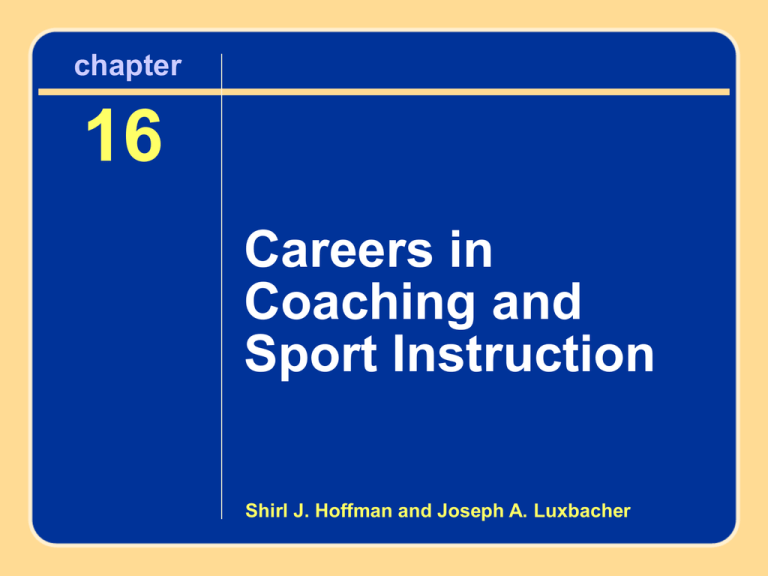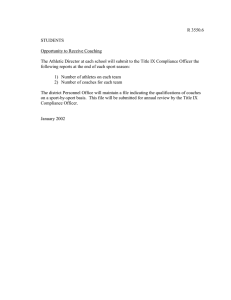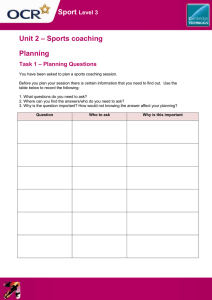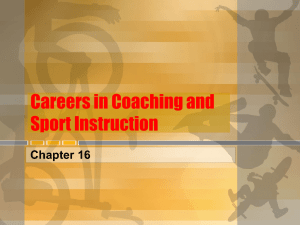16 Careers in Coaching and Sport Instruction
advertisement

chapter 16 Careers in Coaching and Chapter Sport Instruction 16 Careers in Coaching and Sport Instruction Shirl J. Hoffman and Joseph A. Luxbacher Goal of Coaching Professions • To help participants in activity settings develop and maintain a modest to high level of motor skill performance and fitness. • This goal is reached through well-designed practice and conditioning sessions that involve explanation, instruction, and verbal and visual feedback (replays and demonstrations). Figure 16.1 Figure 16.2 Comparing Sport Instruction and Coaching Duties • Instructors tend to spend relatively more of their time with on-task duties: disseminating knowledge and molding student behaviors. • Coaches spend more time on the off-task duties: recruiting, scouting, reviewing films, scheduling, budgeting, fund-raising. Figure 16.3 Sport Coaching and Instruction The acts of sport coaching and sport instruction are more similar than distinct, but the professions of sport coaching and sport instruction are more distinct than similar. Coaching and Sport Instruction Settings • Community settings Civic minded in principle; first goal is improvement of the social, physical, and moral development of the local community through physical activity. The reality is that many volunteer coaches focus on winning (even at all costs). • Institutional settings – High school and middle school settings – College and university settings – Other institutional settings • Commercial sport settings For-hire by elite athletes K–12 Teachers • Instruction in motor skills, sport strategies, fitness, healthy lifestyles • Bachelor’s degree or higher plus state teaching licensure • Many secondary responsibilities – Grading, workshops, parent meetings, equipment purchase and maintenance – May also coach in school and nonschool settings Community College Instructors • Teach focused activity classes and classes in health, first aid, and CPR • Master’s degree University and Colleges Positions and responsibilities vary depending on the size and focus of athletics at the institution • Larger four-year institutions: coaching is the primary (and often only) responsibility • Smaller four-year institutions and community colleges: coaching is a secondary duty and is one of many held by each individual coach Up-Close Views of Coaching and Sport Instruction • Community physical activity program instructors – Community youth sport development leaders – Adult and older adult sport leaders – Education and certification of community youth sport instructors • Professional sport instructors Certification and education of professional sport instructors • Coaching – – – – – Youth sport coaches Coaching in institutional settings Coaching in middle and secondary schools Coaching in colleges and universities Coaching professional sports (continued) Up-Close Views of Coaching and Sport Instruction (continued) • Certification and continuing education of coaches – Certification of youth sport coaches – Education and certification of middle and high school coaches • Ethics and coaching • Sport psychologists Nontraditional Settings Traditional educational settings are not the only place a person can teach physical activity. Many community organizations and nonprofit agencies are in need of physical activity teachers to provide good instruction. Settings for Coaching Teaching Professionals • Offer services—private or group lessons— solely in an activity of their expertise • More similar to coaches than any other kind of teachers • Swim instructor, golf pro, tennis pro • Certification needed in some sports (PGA, LPGA) Community Coaches • Volunteer positions • Coach practices and weekly games, attend coaches’ meetings • Teach basic skills, teach rules of the game, keep game stats • American Sport Education Program (ASEP) or National Federation of State High School Associations (NFHS) certification Secondary Public School Coaches • Primarily teach; receive stipend for coaching • Teach physical skills; keep stats; schedule practices, games, tournaments; manage equipment; arrange transportation; raise funds • NASPE National Standards for Athletic Coaches • ASEP or NFHS certification College and University Coaches • Team and facility management, budgeting, recruiting, public relations, athlete eligibility • Winning more important • Differences between Division I and III schools • No national or state requirements— established name, college playing experience, coaching experience Professional Sport Coaches • Many nonteaching and noncoaching duties: administration, recruitment, media appearances • Employment retention depends on producing a winning team • No national or state requirements— established name Sport Psychologists • Trained practitioners – Clinical – Educational • Teach athletes mental imagery, relaxation, goal setting, self-talk, concentration for purpose of performance enhancement • No national certification requirements • AAASP-certified consulting program • Coaches may opt to receive training in sport psychology to assist when a sport psychologist is not present. Success Successful teaching and coaching require skills beyond scientific knowledge. Most successful teachers and coaches have people skills that enable them to develop a rapport with, and create a sense of community among, participants. National Federation of State High School Associations Coaches’ Code of Ethics • Develop character. • Be honorable. • Take an active role in prevention of substance abuse. • Avoid use of alcohol and tobacco in athletes’ presence. • Promote entire interscholastic program. • Be knowledgeable of rules. • Enhance sportsmanship. • Respect officials. • Be cordial. • Do not exert pressure on faculty. • Practice legal scouting. See full text on page 469 in the textbook or visit the NFHS Web site: http://www.nfhs.org/web/2004/01/the_coaches_code_of_ethics.aspx Advice for Coaching and Sport Instruction Students • Are you really suited? • Lay out a plan: – Identify opportunities to take coaching courses. – Seek coaching experience. – Be a voracious reader of materials related to the sport. – Build a network of active coaches (begin NOW). • Work on perceived weaknesses. Are You Suited for a Sport Instruction or Coaching Career? • Which setting (community, commercial, institutional)? • What athletes (youth, skilled, specialized)? • Do you have an entrepreneurial spirit? • Are you good at dealing with people? • Are you an effective communicator? • Are you a leader? • Can you plan and organize? • Can you engage in strategy? • Are you organized? • Do you have good judgment? • Are you happy with success and failure? • Are you comfortable with others’ evaluating you always? • Can you look beyond win– loss records?



